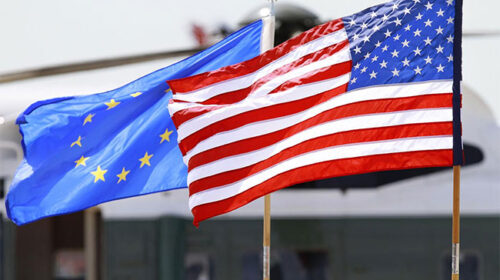US, EU urges Sri Lankan political parties to cooperate and work quickly to achieve political and economic stability
 The European Union (EU) and the US on Sunday urged Sri Lanka’s political fraternity to cooperate, focus and work quickly’ to achieve a peaceful, democratic and orderly transition amid the island nation’s worst economic and political crisis in decades.
The European Union (EU) and the US on Sunday urged Sri Lanka’s political fraternity to cooperate, focus and work quickly’ to achieve a peaceful, democratic and orderly transition amid the island nation’s worst economic and political crisis in decades.
On July 9, thousands of irate anti-government protesters stormed the official residence of embattled President Gotabaya Rajapaksa and forced him to offer his resignation on July 13. A mob also torched the private house of Prime Minister Ranil Wickremesinghe.
Rajapaksa would resign on July 13, Parliament Speaker Mahinda Yapa Abeywardena said on Saturday night, while Prime Minister Wickremesinghe has already expressed his willingness to step down. In Washington, a State Department spokesperson said the US calls on the Sri Lankan parliament to approach this juncture with a commitment to the betterment of the nation not any one political party.
“We urge this government or any new, constitutionally selected government to work quickly to identify and implement solutions that will achieve long-term economic stability and address the Sri Lankan people’s discontent over the worsening economic conditions, including power, food and fuel shortages”, the spokesperson said. The spokesman also warned against attacks on protesters or journalists, but also criticised Saturday’s violence.
“The Sri Lankan people have the right to peacefully raise their voices, and we call for the full investigation, arrest and prosecution of anyone involved in any protest-related violent incidents”, the spokesperson added. In Brussels, the European Union said it was closely following the evolving situation in Sri Lanka.
“We are closely following developments in Sri Lanka, and call on all parties to cooperate and focus on a peaceful, democratic and orderly transition”, said a statement released by the European Union. It is the responsibility of all party leaders to pave the way to a solution to the current crisis and return back to normalcy, it said.
The EU said it is assessing the available options to further step up its support to Sri Lanka’s population.
President Rajapaksa has historically endured a thorny relationship with the US over the dismissal of allegations of war crimes during Sri Lanka’s decades-long civil war. Nevertheless, Washington has over the past two months offered USD 120 million in new financing for Sri Lankan small and medium-sized businesses, a USD 27 million contribution to Sri Lanka’s dairy industry and USD 5.75 million in humanitarian assistance to help those hit the hardest by the economic crisis.
The US has also committed USD 6 million in new grants to provide livelihood assistance to vulnerable populations, and technical assistance on financial reform that will help stabilise the economy.
Sri Lanka, a country of 22 million people, is under the grip of an unprecedented economic turmoil, the worst in seven decades, crippled by an acute shortage of foreign exchange that has left it struggling to pay for essential imports of fuel, and other essentials.
Source: PTI
–Agencies